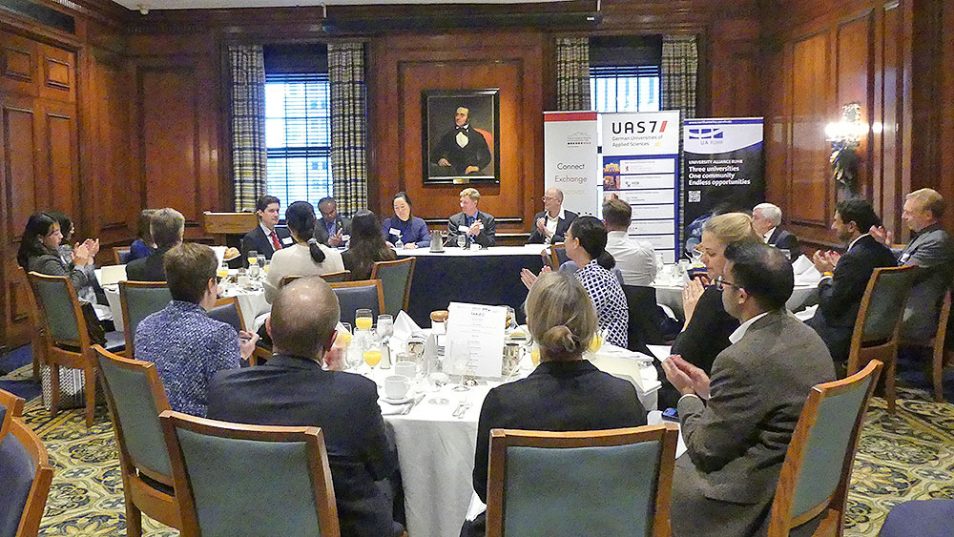Promoting science, strengthening democracy
 © DWIH New York
© DWIH New York
Global crises in particular reveal the enormous potential offered by closer cooperation between science and diplomacy. At the end of November 2022, the DWIH New York brought together stakeholders from both areas for an intense network meeting.
In the east of Manhattan, in the direct vicinity of the German Center for Research and Innovation (DWIH) New York, is the headquarters of the United Nations, one of the most important addresses for negotiating global diplomatic relations. Despite this physical proximity, however, dialog between research and science on the one hand and international politics on the other could definitely be more intensive. “We know by now how important it is, when faced with multiple global crises, to bring science and politics even closer together by way of science diplomacy,” says Dr. Jan Lüdert, Head of Programs at the DWIH New York. “But as we see it, the degree of institutional integration in particular is still not sufficient.”
What is needed here is for the relevant actors to network with each other more effectively. And that was precisely the aim of the expert breakfast meeting “Science Diplomacy in International Organizations – Fostering Multilateral Resilience and Driving Sustainable Innovations”, which was hosted by the DWIH on November 30, 2022. Around 30 participants from leading research institutions, the United Nations, universities and non-governmental organizations came together to discuss the role of different actors in today’s multilateralism while at the same time looking at the importance of science diplomacy for international organizations.
The event focused on the DWIH focus topic “Sustainable Innovations”. “Among other things, we wanted to find out how science-based political action can contribute to accelerating implementation of the UN Sustainable Development Goals,” says Dr. Lüdert. “And what conditions are needed for valuable synergies to emerge between science and politics.” A welcome by Wolfram von Heynitz, Deputy Consul General of Germany in New York, was followed by a total of three brief presentations, before participants continued their dialog in small groups.
Enhancing science diplomacy through trust
Speaker Katarina Kuai, who works on innovation for the United Nations Development Coordination Office (UNDCO), spoke about two key issues: what can we do to generate enthusiasm among young people for multilateralism, and how can we promote constructive interaction between science and diplomacy? In doing so, she pleaded for a diversification in science, not least in the sense of greater citizen participation. However, a key requirement here would be to establish critical scientific thinking in educational curricula at an early stage, she said.
In the view of Dr. Bill Hunter of Lehigh University in Pennsylvania, the initiator of his university’s partnership program with the United Nations, too little is done to explore the links between the natural sciences and the social sciences in school and university education. Curricula needed to be adapted accordingly, with the aim of promoting political skills in the STEM area as well, he said. In order to break down existing silos, said Hunter, one could draw on techniques for simulating multilateral processes, for example, such as those used at Lehigh University. Above all, however, there had to be a clear idea of the capabilities and potential of science in the current context, he said. “It was fascinating to see how our small group started by discussing what the term science diplomacy even means,” said Hunter in conversation with Dr. Lüdert after the event. “But it’s precisely this impulse towards mutual understanding that is so crucial in view of the global trend towards ever greater social polarization.”
Similar arguments were put forward by Mathy Stanislaus, Executive Director of The Environmental Collaboratory, a cooperative project run by Drexel University and the Academy of Natural Sciences. Stanislaus sees one of the biggest challenges as maintaining trust in science and restoring it where it has been lost. He believes science communication has a key role to play here. “We can only succeed in building trust if we as scientists are able to reach people outside our bubble.” This also meant seeing universities much more than before as partners in social transformation processes, he said: “We need to involve all stakeholders at the local and global level.”
Dialog for better decisions
There was also intense discussion of the potential limitations of value-based science diplomacy in connection with pragmatic politics. DWIH Director Benedikt Brisch reports on a debate on this subject in his group. “The example of China shows how complex the situation here is,” says Brisch. European and American researchers work very successfully with Chinese scientific partners for mutual benefit, he says, but there are major differences with regard to issues of critical publicity and freedom of expression. “It’s important to be able to defend your own values with arguments. There are limits to justifiable institutional cooperation, but science is capable of promoting dialog between civil societies and improving our knowledge of other social systems – and thereby contributing to better decisions, too.”
There is no doubt that science diplomacy has a crucial role to play in defending open, democratic thinking against autocratic tendencies, even in such challenging contexts. “In a world where evidence-based decision-making has come under pressure, it’s important to remain vigilant and find ways in which we can see science diplomacy more as something positive that can achieve the Sustainable Development Goals in an effective, deliberate and inclusive way,” says Dr. Lüdert, summarizing one of the crucial insights of the event.
Klaus Lüber
For more information on DWIH New York’s focus on science diplomacy, see here.
